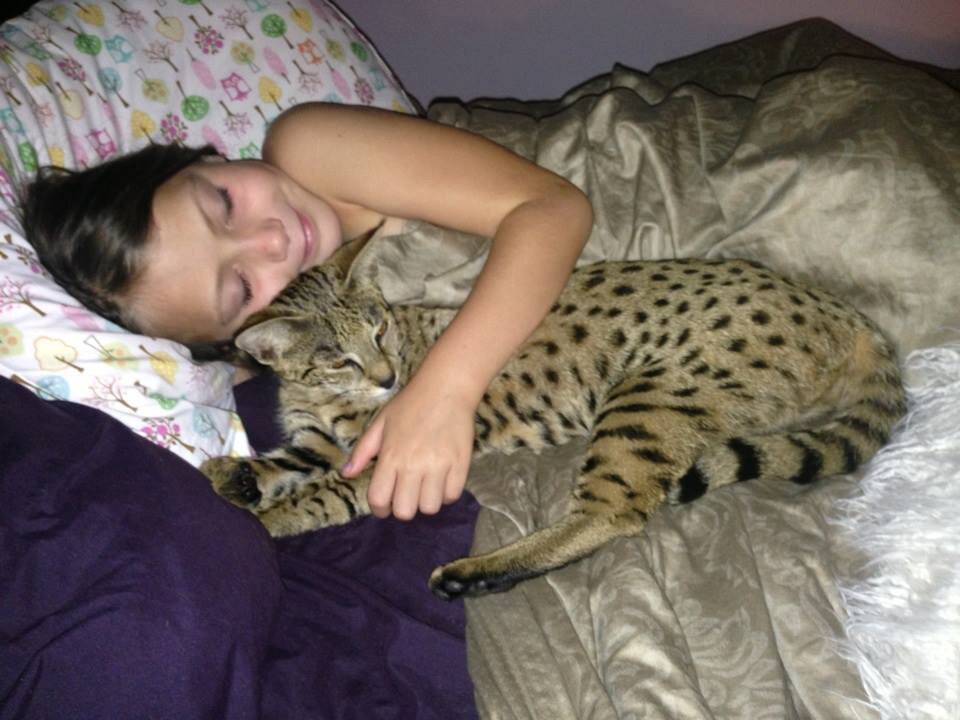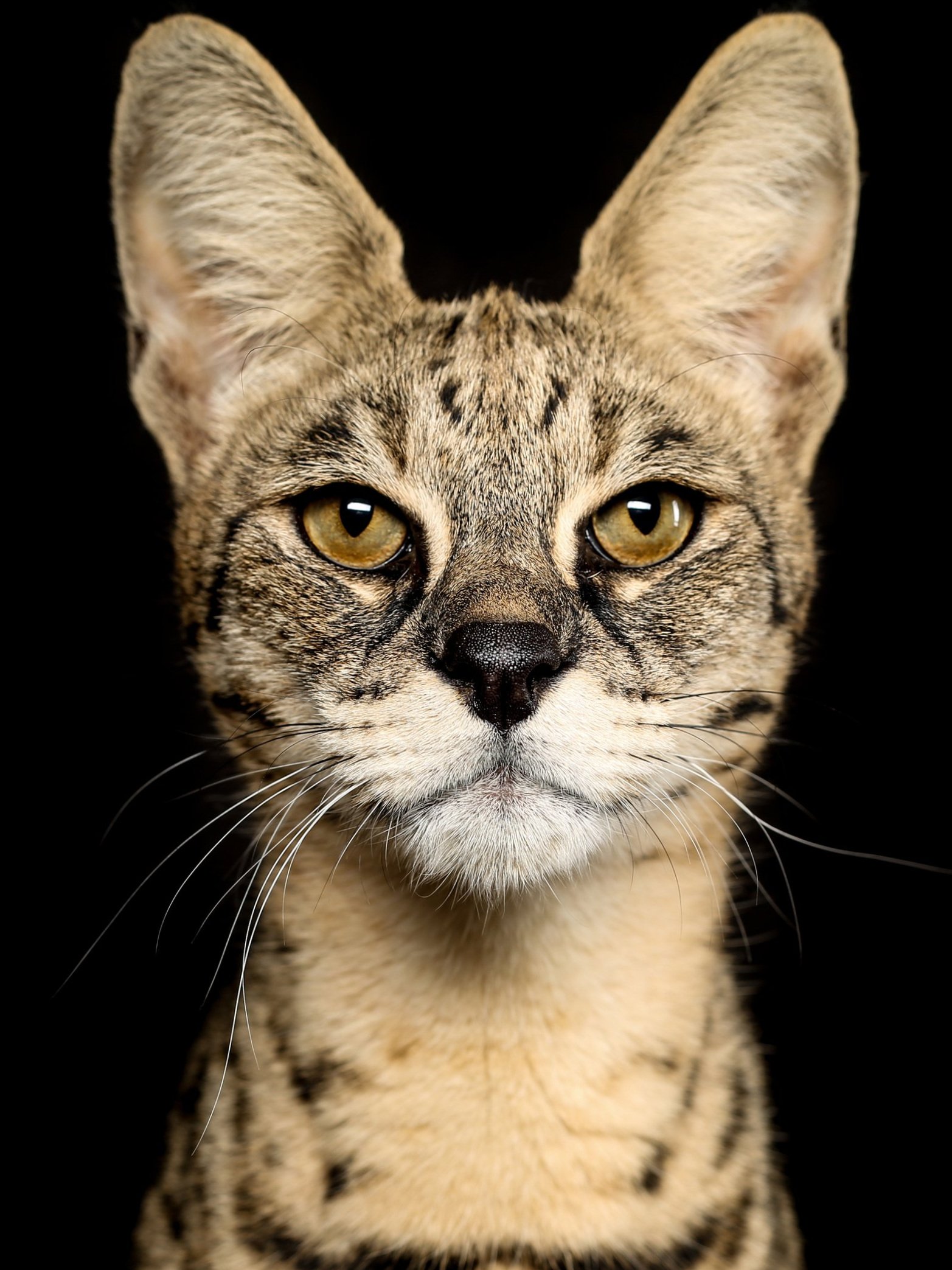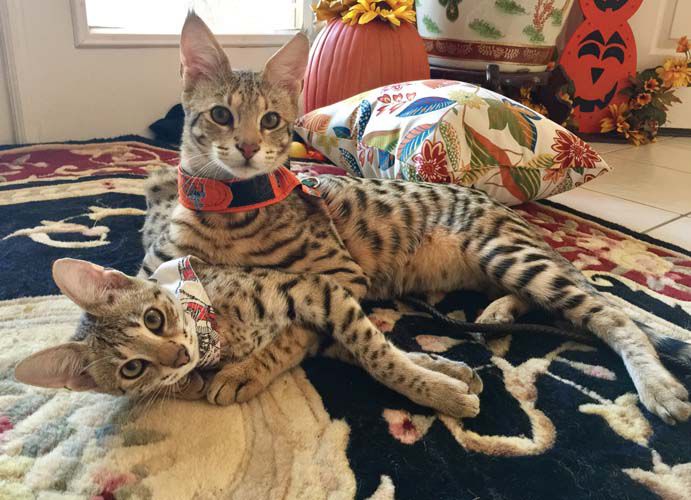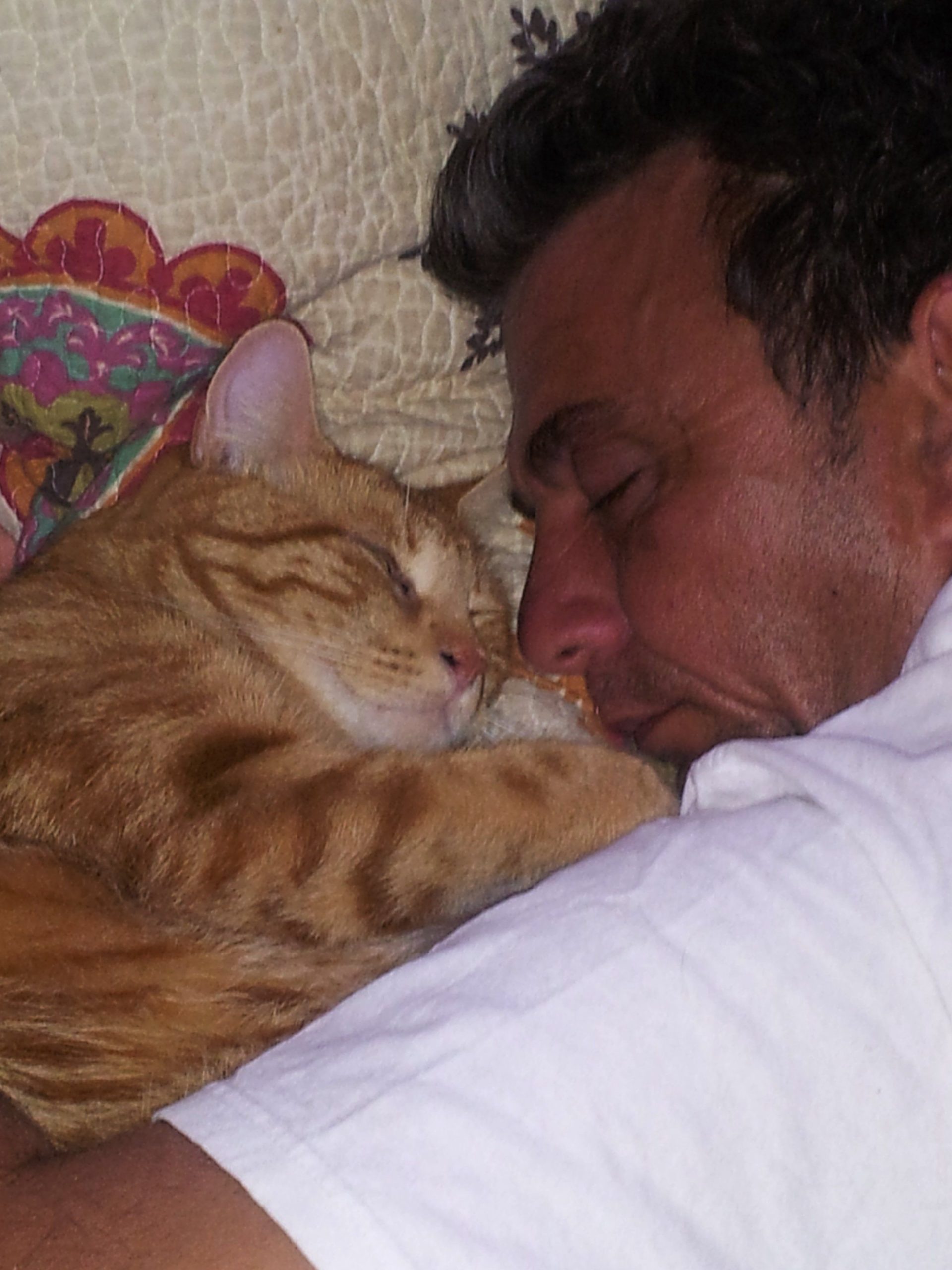Contents
- I. Introduction
- II. Savannah Cats: An Overview
- III. Savannah Cats and Their Vocalization
- IV. Understanding the Purring Behavior of Savannah Cats
- V. Factors Affecting the Purring of Savannah Cats
- VI. Frequently Asked Questions about Savannah Cats’ Purring
- 1. Do all Savannah cats purr?
- 2. Why do Savannah cats purr?
- 3. Is purring exclusive to Savannah cats?
- 4. Can Savannah cats purr loudly?
- 5. Are there specific situations when Savannah cats purr more?
- 6. Can Savannah cats purr when they are angry or upset?
- 7. How can I tell if my Savannah cat is purring?
- 8. Can Savannah cats purr while they are asleep?
- 9. Can I encourage my Savannah cat to purr?
- 10. Are there any health benefits associated with Savannah cats purring?
I. Introduction

Savannah cats are a unique breed known for their exotic appearance and playful nature. With their striking spotted coat resembling that of a wild African Serval, it’s no wonder these felines have gained popularity among cat lovers worldwide. However, there’s one question that often arises when it comes to Savannah cats – do they purr at all?
While purring is a common behavior in most domestic cats, the Savannah cat’s vocalizations are not as straightforward. These hybrid cats, a cross between a domestic cat and a Serval, exhibit a wide range of vocalizations that go beyond the typical purring sound.
No Ordinary Purr: Understanding Savannah Cat Vocalizations
When it comes to communication, Savannah cats have a unique way of expressing themselves. They possess a diverse vocal range that includes chirps, trills, hisses, and even growls. While purring is not entirely absent in Savannah cats, it may not be as prominent or easily recognizable as in other breeds.
It’s important to note that Savannah cats are highly intelligent and often use their vocalizations to convey various emotions and needs. They may purr softly when content or seeking attention, but they are more likely to communicate through a combination of purring, chirping, and other distinctive sounds.
Factors Influencing Purring Behavior in Savannah Cats
The reduced purring behavior in Savannah cats can be attributed to several factors. Firstly, their genetic makeup plays a significant role. As hybrid cats, they retain some of the qualities and behaviors of their wild ancestors, the Servals. Wild cats, including Servals, tend to be less vocal overall, relying on other forms of communication, such as body language and scent marking.
Secondly, the size and structure of the Savannah cat’s vocal cords may also contribute to the difference in their purring behavior. Their vocal cords are believed to be thicker and less flexible compared to those of domestic cats, resulting in a deeper, throatier sound when they do purr.
Understanding Your Savannah Cat’s Communication
As a Savannah cat owner, it’s essential to familiarize yourself with your cat’s unique vocalizations and behaviors. Each Savannah cat is an individual, and their communication style may vary. Pay attention to the different sounds they make and observe their body language to decipher their needs and emotions.
Remember, while Savannah cats may not purr as frequently or conventionally as other cats, they still possess their own ways of expressing contentment, affection, and other emotions. By understanding and respecting their communication style, you can forge a stronger bond with your Savannah cat and provide them with the care and attention they need.
II. Savannah Cats: An Overview

Savannah cats are a fascinating breed known for their exotic appearance and playful nature. These hybrid cats are a cross between a domestic cat and a wild African serval. With their striking coat patterns, long legs, and large ears, Savannah cats resemble their wild ancestors while retaining the loving and affectionate qualities of domestic cats.
1. Appearance
One of the most distinctive features of Savannah cats is their unique coat markings. They can have a variety of coat colors, including brown, silver, and black, with spots, stripes, or marbled patterns. Their coats are short and can be either close-lying or slightly longer in length. Savannah cats also have a lean and muscular build, complemented by their long legs and agile bodies.
2. Personality
Savannah cats are known for their energetic and playful nature. They are highly intelligent and curious, always exploring their surroundings. These cats enjoy interactive play and can be trained to perform tricks or walk on a leash. Despite their wild appearance, Savannah cats are affectionate and form strong bonds with their human companions. They often seek attention and enjoy being part of the family.
3. Care and Maintenance
Because of their wild heritage, Savannah cats have specific care requirements. They need a large and stimulating environment to satisfy their need for exercise and mental stimulation. Providing them with climbing structures, puzzle toys, and interactive play sessions can help keep them entertained. Regular veterinary check-ups, vaccinations, and a balanced diet are also essential for their overall well-being. Additionally, Savannah cats may require a specialized diet due to their unique nutritional needs.
4. Legal Considerations
It is important to note that owning a Savannah cat may be subject to legal restrictions in some areas. Due to their hybrid nature, some jurisdictions classify them as exotic animals and require special permits or restrictions on ownership. It is crucial to research and understand the local regulations before bringing a Savannah cat into your home.
III. Savannah Cats and Their Vocalization

When it comes to vocalization, Savannah cats have a unique way of expressing themselves. While they may not purr like traditional domestic cats, they have a wide range of vocal sounds that they use to communicate with their owners and other animals.
The Chirp of a Savannah Cat
One of the most distinct vocalizations of a Savannah cat is the chirping sound they make. This sound is often compared to the chirp of a bird and is a form of communication that Savannah cats use to express excitement or interest. It’s not uncommon to hear a Savannah cat chirping when they see something fascinating or when they are playing.
The Hiss and Growl of a Savannah Cat
Like any other cat, Savannah cats can also hiss and growl when they feel threatened or agitated. This is their way of warning others to stay away and is often accompanied by an arched back and fluffed-up tail. It’s important to respect a Savannah cat’s boundaries when they display these vocalizations, as they are trying to communicate their discomfort.
Meowing and Other Sounds
Savannah cats can also meow, although their meows may sound different compared to traditional domestic cats. They may have a more raspy or deeper tone, which adds to their unique charm. Additionally, Savannah cats might make other sounds like trills, squeaks, or even a combination of different vocalizations to express themselves.
The Silent Stalker
Despite their extensive vocal repertoire, Savannah cats are known for being excellent hunters and have a natural inclination to stalk silently. This means that they may not always rely on vocalizations to communicate, but instead use their body language and stealth to observe and hunt their prey.
IV. Understanding the Purring Behavior of Savannah Cats

Savannah cats are known for their unique behaviors and characteristics, and one of the most fascinating aspects of their behavior is their purring. Purring is a common behavior in domestic cats, but do Savannah cats purr at all? Let’s take a closer look at this intriguing behavior.
1. The Purpose of Purring
Purring is often associated with contentment and relaxation in cats. It is a way for them to communicate their feelings of comfort and satisfaction. However, purring is not limited to positive emotions. Cats also purr when they are anxious, in pain, or seeking attention. It is a multifaceted behavior that serves various purposes.
2. The Mechanics of Purring
Purring is produced by the rapid vibration of the cat’s laryngeal muscles, combined with the movement of blood in the veins surrounding the vocal cords. This creates a unique sound that is distinct to each cat. The frequency and intensity of the purring can vary depending on the individual cat and the situation.
3. Purring in Savannah Cats
Savannah cats, being a crossbreed between domestic cats and wild servals, have inherited the ability to purr from their domestic ancestors. They are capable of purring just like any other domestic cat. However, their purring may have a slightly different tone or intensity due to their wild heritage.
4. Purring as a Form of Communication
While purring is often associated with contentment, it can also serve as a form of communication between cats and their owners. Savannah cats may purr to indicate that they want attention, food, or affection. It is essential for owners to understand the context and other accompanying behaviors to interpret the meaning behind the purring.
5. Health Benefits of Purring
Purring has been linked to several health benefits for cats, including stress reduction, pain relief, and even healing of bones and tissues. The vibrations produced during purring have a calming effect on the cat’s body, promoting relaxation and well-being.
V. Factors Affecting the Purring of Savannah Cats

Savannah cats are known for their unique characteristics and behaviors, and one intriguing aspect is their purring. While most domestic cats purr, there are several factors that can affect the purring of Savannah cats.
1. Breed Specific Traits
Savannah cats are a crossbreed between domestic cats and the serval, a wild African feline. This hybridization results in unique physical and behavioral traits, including their purring. The size and shape of their vocal cords and larynx may differ from other cat breeds, leading to variations in their purring sounds.
2. Emotional State
Like any other cat, the emotional state of a Savannah cat can influence its purring behavior. Cats often purr when they are content and relaxed. However, Savannah cats may have a different range of emotional responses due to their wild ancestry. They may purr when happy, but also when anxious or stressed. Understanding their body language and overall behavior is crucial in interpreting their purring signals accurately.
3. Health and Discomfort
A cat’s health can impact its purring. Savannah cats, like any other breed, may purr to self-soothe when experiencing pain or discomfort. It’s essential to monitor their overall health and behavior to ensure they are not purring due to any underlying health issues or injuries.
4. Environmental Factors
The environment in which a Savannah cat lives can have an impact on their purring. Cats often purr to communicate with their owners or other animals. If the environment is noisy or stressful, it may affect the frequency or intensity of their purring. Providing a calm and peaceful environment can encourage a Savannah cat to purr more often.
5. Individual Personality
Every Savannah cat has its own unique personality, and this can influence their purring habits. Some cats may be more vocal and purr frequently, while others may be quieter and purr less often. It’s important to understand and appreciate the individuality of each cat and not expect every Savannah cat to purr in the same way.
VI. Frequently Asked Questions about Savannah Cats’ Purring
1. Do all Savannah cats purr?
Yes, just like domestic cats, all Savannah cats have the ability to purr. Purring is a natural behavior that indicates contentment and relaxation.
2. Why do Savannah cats purr?
Savannah cats purr for various reasons. It can be a sign of happiness and satisfaction, as well as a way to communicate with their owners. Purring can also be a self-soothing mechanism for Savannah cats when they are feeling stressed or anxious.
3. Is purring exclusive to Savannah cats?
No, purring is not exclusive to Savannah cats. Purring is a common trait among domestic cats and is observed in many other cat breeds as well.
4. Can Savannah cats purr loudly?
Yes, Savannah cats are known to have a louder purr compared to other cat breeds. Their deep vocalizations can be quite distinctive and can often be heard from a distance.
5. Are there specific situations when Savannah cats purr more?
Savannah cats may purr more when they are feeling content, such as when they are being petted or cuddled. They may also purr when they are seeking attention or trying to communicate with their owners.
6. Can Savannah cats purr when they are angry or upset?
While purring is generally associated with positive emotions, Savannah cats may also purr when they are feeling upset or stressed. It can be a way for them to self-soothe and calm themselves down.
7. How can I tell if my Savannah cat is purring?
When a Savannah cat purrs, you can feel vibrations in their body, particularly in their chest and throat area. You may also hear a rhythmic, vibrating sound that is produced as they breathe in and out.
8. Can Savannah cats purr while they are asleep?
Yes, Savannah cats can purr while they are asleep. Purring is a reflexive behavior and can occur even when they are in a deep sleep.
9. Can I encourage my Savannah cat to purr?
Affection, gentle strokes, and spending quality time with your Savannah cat can help create a comfortable and relaxed environment, which may encourage them to purr. Each cat is unique, so it’s essential to understand what your cat enjoys and respond accordingly.
10. Are there any health benefits associated with Savannah cats purring?
Research suggests that the vibrations produced during purring can have a positive impact on a cat’s overall health. It is believed to promote healing, reduce stress levels, and even lower blood pressure. However, it’s important to note that purring alone is not a substitute for proper veterinary care.

Jackson is an accomplished content writer with a flair for captivating storytelling. With a Bachelor’s degree in English Literature from the prestigious University of California, Berkeley, Hunter’s educational background has honed his writing skills to perfection. His love for felines is evident in his extensive knowledge of cat behavior and care, making him an expert in the field. Hunter’s passion for cats has led him to contribute insightful articles to various online platforms, providing valuable information and tips to cat owners worldwide. With his exceptional writing abilities and deep understanding of cats, Hunter continues to create engaging content that resonates with readers and leaves a lasting impact.
